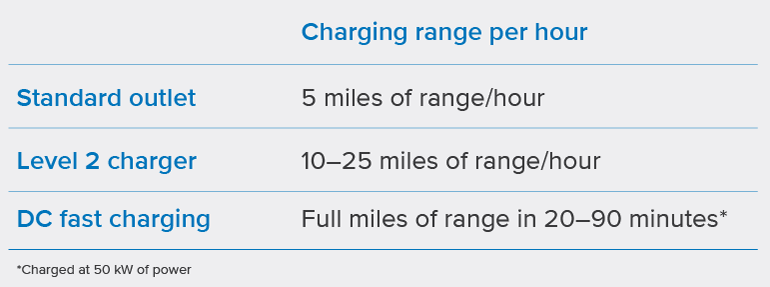
EV Frequently Asked Questions
What is an electric vehicle? Is a hybrid an electric vehicle?
Vehicles with a battery that can be charged from an external source are considered plug-in vehicles or PEVs.
A common PEV is a battery electric vehicle, which is a fully electric vehicle powered by an electric motor with no gas engine.
Another PEV is a plug-in hybrid electric vehicle, which has a plug-in electric system and a gas engine as backup. These vehicles can plug directly into an outlet.
Are EVs actually affordable?
Yes. With more than two dozen plug-in electric vehicles available under $40,000 (before incentives), there is an EV for every pocketbook. In addition to an affordable sticker price, the operations and maintenance of an EV are a quarter of the cost of owning and operating a traditional gas-powered vehicle. Over the life of ownership, you will save thousands of dollars driving an electric vehicle compared to an equally priced gas-powered vehicle.
Will I be able to drive long distances? What type of range do EV’s have?
Yes. The average person drives only 29 miles per day. If that’s you, then there are dozens of cars that will work for your life. If you require more range, there are many vehicles with ranges between 100 and 300 miles per charge.
If you are planning a road trip, the Oregon Electric Highway is an extensive network of electric vehicle fast charging stations along I-5, Highway 99 and other major roads in British Columbia, Washington, Oregon and California. You can also plan your road trips using Travel Oregon’s Electric Byways, where you can visit the Oregon Coast Electric Byway, North Oregon Coast Electric Byway, Mount Hood & Columbia River Gorge Electric Byway and several more.
Do electric vehicles really reduce emissions? How does buying an EV help the environment?
Yes. When you use PGE’s basic service to charge, the equivalent annual emissions for a typical EV is 2,688 pounds of CO2. The national average for a gas-powered car is 11,435 pounds of CO2. If you choose to enroll in one of PGE’s renewable options, you can reduce your annual impact to zero pounds of CO2.
Where can I charge an electric vehicle?
Ninety percent of EV owners charge at home, which can be done by simply plugging into a wall outlet or by installing a Level 2 home charger. If you’re unable to charge at home, Oregon has nearly 1,250 public charging stations with seven charging networks, including PGE’s Electric Avenues.
If you’re new to electric cars, or just want to understand charging better, we recommend using the Chargeway app. Chargeway customizes results that fit vehicles’ preferences, so you can find quick, convenient charging anywhere.
How long does an EV take to charge?

Are electric vehicles slower than gas-powered vehicles? Am I sacrificing performance with an EV?
No. In typical city driving, EVs are much quicker and more fun to drive than gas-powered vehicles. EVs have maximum torque available even at a complete standstill. That instant throttle, combined with a low center of gravity, make for an exhilarating driving experience.
Do electric cars have a short lifespan?
Electric vehicle batteries are estimated to be serviceable for 10 years or longer. All manufacturers offer a lengthy warranty. Most EVs have shown excellent performance due to sophisticated battery management systems and cooling technology.
Can a battery from an electric vehicle be recycled?
When your EV reaches the end of its life, your vehicle dealer can recycle and repurpose the battery for alternate energy storage purposes.
Do electric vehicles need regular tune-ups?
Electric Vehicles generally need less service than gas-powered engines. A gas engine has more than a thousand moving parts. Your electric motor has just three. With fewer parts, there are fewer things that can go wrong. Typical Electric Vehicle maintenance consists of rotating tires once or twice a year, and replacing brake fluid every few years.
Can the vehicle be towed?
Yes and no. Unlike gas-powered vehicles, EV motors are connected to the wheels, so they require additional considerations when towing. Your owner’s manual will provide safe towing methods specific to your vehicle.
What happens if my vehicle runs out of charge?
Your vehicle will alert you when your charge is starting to get low. It will typically take extra precautions to curtail non-essential vehicle functions to extend your battery range as well. If you do run out of a charge, you will need to have your vehicle towed to your home or a charging station.
Can I drive in the rain and take the vehicle through a car wash?
Yes. EV batteries are completely contained and protected from the elements.